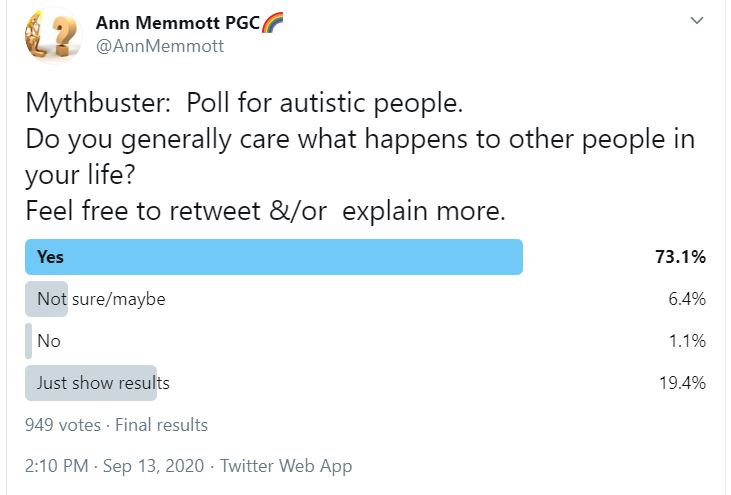"Social Responsiveness Scale" (SRS). I want to take another gallop through this extremely strange questionnaire that has been used to prove & #39;deficits& #39; in autistic people. Does it?
Here we go...and I& #39;ve rephrased where necessary to fit in with autistic communication & culture/
Here we go...and I& #39;ve rephrased where necessary to fit in with autistic communication & culture/
SRS: Shows distress in utterly overloading social situations, whilst trying to save brain from entry into avoidable shutdown or meltdown (which we know are brain events, not a & #39;tantrums& #39;).
Under stress, finds best ways to divert brain overload into safer hobbies and routines/
Under stress, finds best ways to divert brain overload into safer hobbies and routines/
SRS: Other people target autistic individuals, but we like to blame the autistic person for this.
Finds being with random loud nonautistic people very stressful, when trying to stay at a safe brain-operating-range, so may retreat to a suitable point of quiet/
Finds being with random loud nonautistic people very stressful, when trying to stay at a safe brain-operating-range, so may retreat to a suitable point of quiet/
May need to use another person& #39;s eyes and ears to navigate through deafening, blinding environments, so will stay by their side. "Guide dog" principle applies. Example:
Because people misunderstood what was happening, they describe this as & #39;clingy& #39;/
Because people misunderstood what was happening, they describe this as & #39;clingy& #39;/
Plays according to autistic needs, often with extreme focus and dedication. Pays attention to the physics and art of objects in ways that non-autistic children may miss. May enjoy the joy of pattern and colour in ways that are different to non-autistic children/
You& #39;ll notice I& #39;m not using the original wording of the questionnaire at all.
Nor am I being negative about autistic people.
It& #39;s perfectly possible to explore autistic difference without being rude/ignorant. Unlike the questions in the original.
Nor am I being negative about autistic people.
It& #39;s perfectly possible to explore autistic difference without being rude/ignorant. Unlike the questions in the original.
I do not doubt that ignorance was at the heart of most of the questionnaires languishing behind paywalls and stuck in obscure research documents.
But that negative narrative damages autistic lives.
It sets autistic children up for a lifetime of enforced normalisation/
But that negative narrative damages autistic lives.
It sets autistic children up for a lifetime of enforced normalisation/
/in which they are trained to appear non-autistic, to prove they are now & #39;normal& #39;. The end result of having to live inauthentically for year after year is mental health difficulties, entirely unsurprisingly. Good research showing that such & #39;masking& #39; may lead to suicide/
I put it to the diagnostic communities that it is time to reword the questionnaires, in collaboration with autistic consultants and specialists. To bring them up to date with modern knowledge of autistic culture & communication, brain difference and need.
Then, instead of a world of broken and traumatised autistic individuals, being forced into further brokenness by mostly well-meaning teams, we can begin to restore autistic people to society as our authentic selves.
That narrative has to change.
We can do this, together.
That narrative has to change.
We can do this, together.
Perhaps the most concerning of the questions on the SRS-2 is the question about whether we offer comfort to others when they are sad.
In reality, our way of offering comfort may be *different* to that of non-autistic people.
Designed not to overload already overwhelmed brains/
In reality, our way of offering comfort may be *different* to that of non-autistic people.
Designed not to overload already overwhelmed brains/
Instead of rushing up with overwhelming eye contact, touch and voice tone changes, we may evaluate quietly, offering presence and stillness. Those can be deeply valued by autistic people, and are culturally correct in many circumstances for us.
Non-autistic folk may miss this/
Non-autistic folk may miss this/

 Read on Twitter
Read on Twitter




